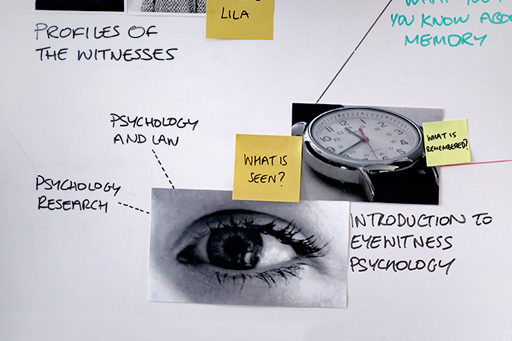2 Introduction to eyewitness psychology
The processes that a witness might go through in any subsequent police investigation are a key focus of this course. What is seen? What is remembered? How can the police best obtain reliable evidence through questioning? How are the suspects identified?
Each of these questions has been the subject of psychological research, which draws on concepts from across the spectrum of psychological theory. This includes theories of memory, showing that it does not work like a videotape or computer, but is instead ‘constructed’, meaning that memories can change over time, particularly when we are questioned about them.
Psychology and law
Although both psychologists and lawyers are closely concerned with human behaviour, the application of psychology in legal issues is fairly recent. This is because, although the subject matter may overlap, the aims of psychologists and lawyers are very different and their approaches vary.
Psychologists are concerned with obtaining knowledge about psychology by conducting rigorous research, which contrasts with lawyers’ use of typically ‘commonsense’ psychology and the reliance placed on their accumulated experience and legal precedents. Whereas psychology is characterised by empirical methods and scientific analyses, law uses its internal systems to scrutinise its ‘evolved’ legal processes. It has also been the case that law, as a profession, has remained sceptical of the ability of disciplines such as psychology to have anything to offer (e.g. Nijboer, 1995). Increasingly, however, psychologists work in collaboration with members of the legal profession. Specialist conferences provide a forum for psychologists and members of the legal profession to come together and communicate with each other. In parallel, there has been a growth in both the number of postgraduate courses in forensic psychology, and the number of psychology or law degrees that include an option in ‘psychology and law’.
A number of different terms have been adopted to describe the applications of psychology to law, including ‘legal psychology’, ‘criminological psychology’, ‘psychology and law’ and ‘forensic psychology’. This is not surprising as the applications are wide-ranging. For instance, there is the work of psychologists who are concerned with the treatment and rehabilitation of offenders, and offender profiling. Additionally, there is research, often conducted in the laboratory, that examines witness testimony, juror decision making and public perceptions and attitudes towards crime and penal sanctions. This course focuses on just one of these research areas, namely witness testimony, which is one of the more extensively investigated areas.
Psychology research
In some cases, psychologists’ research has resulted in changes to the law and legal procedures. For example, reforms to accommodate children’s testimony in the courtroom came about largely as a result of research showing that children’s evidence was more reliable than had previously been believed. Research has also highlighted some of the psychological stresses placed upon child witnesses and how they might be alleviated (Spencer and Flin, 1993). Alternatively, changes that are introduced to legal procedures may prompt new psychological investigations. For example, the need to examine the role of closed circuit television (CCTV) in identification evidence arose from the installation of CCTV systems in many towns and city centres. Thus, while the findings of psychological research may impact upon policy, changes to policy may also prompt research. Therefore the relationship between law and psychology can be viewed as two-way. Psychology research is also influenced by developments in technology, social policy, and the media (e.g. reporting of public outcry over a particular case or event).

